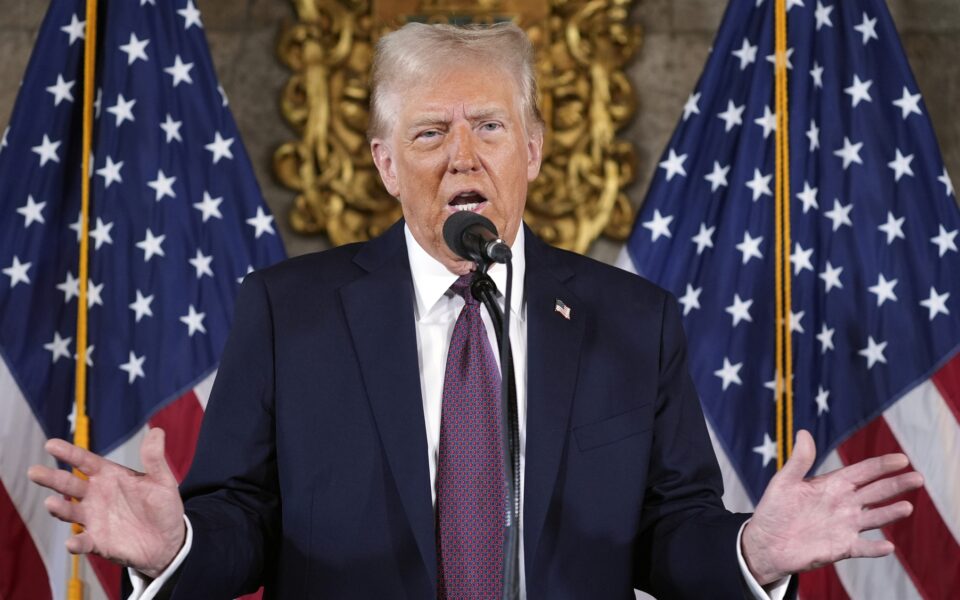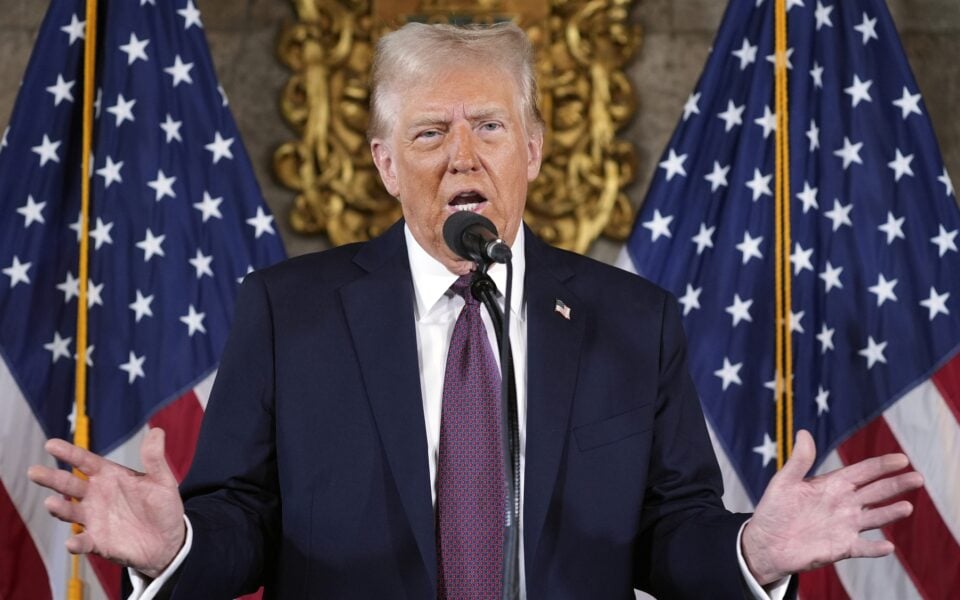
US President-elect Donald Trump speaks during a news conference at Mar-a-Lago, on January 7, 2025, in Palm Beach, Florida. British historian and author Simon Sebag Montefiore says Donald Trump may initially indulge, then pressure Israeli Prime Minister Benjamin Netanyahu to accept ‘the concessions necessary for the wider deal in the Middle East.’ [AP
In a year dominated by wars in Ukraine and the Middle East, few writers could enlighten us more about the background to this seething geopolitical cauldron than Simon Sebag Montefiore. The award-winning TV historian and historical documentary presenter, hailing from a prominent family of the Jewish diaspora, is the author of, among other works, “Stalin: The Court of the Red Tsar,” the global bestseller “Jerusalem: A Biography,” “The Romanovs 1613-1918” (a history of Russia’s czars) and, more recently, “The World: A Family History of Humanity.”
In this exclusive interview, conducted via email, he expounds on Syria, Israel, Trump, Putin, and on whether we are in the early stages of World War III.
Is there a reasonable chance of Syria emerging from the horrors of dictatorship and civil war as a unified, stable country?
There is always hope that Syria can emerge from the horrors of dictatorship and civil war to be a tolerant and peaceful democracy. Why shouldn’t Arab states all be tolerant peace-loving democracies? I am often asked the same question about Russia. Russians are not all programmed to live in dictatorships. Yet dictatorship is a cultural habit into which Russia repeatedly slips. One day that will change. The future of Syria is not up to America or Britain: It is up to the Syrian people. Syria is a multiethnic, multi-sect state, and could function as such. It has a huge educated elite; it is cosmopolitan and shrouded in history; it is the center of the Arab world, from the times of Muawiya and Saladin, and the center of modern Arab nationalism. So the fall of Assad and the creation of a responsible government that states it wishes to live in peace with Israel could reset the paradigm of the entire Arab world.
That’s the hopeful news. But this is the Middle East, with only one (flawed) democracy in the region, with widespread support for Jihadism and political violence. The biggest question of the year is: Who is al-Golani? His background is not just vaguely Islamist: He worked for ISIS and al-Qaeda, for al-Baghdadi himself. His rule in Idlib was pragmatic but also Islamist and autocratic. Yet he is a clearly highly educated and sophisticated scion of an elite family. It is very unusual for Islamists and Jihadists to set aside their views and embrace liberal democracy and tolerance. If he does that, he will be that very rare thing – a secular democratic nation-builder who evolves from terrorist jihadist warlord to the founder of a new Syria. If so, he will be regarded as one of the great men of this century.
A more pessimistic approach might argue that Syria is one of the states created by the Imperial powers (France and Britain) after the Ottoman Empire and that like other such states – Iraq, Lebanon – it has never properly functioned. It is therefore likely to evolve into a federalized republic with Sunni, Alawite and autonomous Kurdish elements, which will be the plaything of outside powers. The influence of Iran and Russia has now been shattered, but US troops remain. And Turkey, which invaded Syria in 2016 and set up an occupation zone and its own proxy militia, is now attacking Kurdish positions, while in the south Israel has occupied a small zone on Mount Hermon. So there is another, less edifying narrative about the prospects of post-Assad Syria. Let’s wait and see.
What is the lesson to draw from the rapid collapse of an autocratic regime widely perceived as solid?
I don’t think it was regarded as solid, but you’re right that analysts and local powers believed that Assad had survived and might recover more territory. The obvious lesson is that dictatorships do fall frequently and I am not sure why some people are surprised by this. Autocracies are often rigid and sclerotic; they gradually destroy state structures and end up functioning like Mafia families. That was the case with the Assads. But of course the fall of the dynasty could expose the weakness of other autocracies in the region. Even more importantly, the success of the HTS militia of al-Golani could also encourage Sunni Islamism in other states too, encouraged by Turkey. Beyond the Middle East, one of the reasons Putin backed Assad after 2011 was the threat he felt when he saw the lynching of Gaddafi in Libya. Undoubtedly, the fall of this Russian-backed dictator could expose Putin himself and could have implications for anti-Russian movements in Georgia and other places too.
Turkey has emerged as the regional player with the most influence in Syria. Could the new regime become a client of Ankara? Or will the legacy of Ottoman rule mean there will be resistance and limits to Turkish influence?
Yes, the two powers that are ascendant now are Turkey and Israel. Whoever is in power in Turkey, whether it’s a secular general or an Islamist like Erdogan, they are violently opposed to the creation of a Kurdish state that could encourage Kurdish separatism and terrorism inside Turkey. That is Erdogan’s first priority in Syria. Secondly his movement is an offshoot of the Muslim Brotherhood, as is Hamas. Even though he does not control al-Golani and HTS, he is allied with them and their rise is to his benefit. Third, he has 3 million Syrian refugees that he needs to return to Syria. And fourth, yes, Turkey is a state with imperialist neo-Ottoman aspirations in a region ruled by the Ottomans from 1516 to 1918; now it is back in Syria with troops on the ground. While any move by Israel anywhere sparks wild protests, no one has challenged the Turkish occupation of northern Syria, and there’s scarcely been a grumble about Turkish advances into Kurdish lands. If Erdogan doesn’t blow it, this is Turkey’s moment.
‘While any move by Israel anywhere sparks wild protests, no one has challenged the Turkish occupation of northern Syria,’ historian Simon Sebag Montefiore tells Kathimerini
Netanyahu’s Israel has achieved stunning military success in the last 14 months, but its reputation has been badly tarnished. Is it a frontline defender of the rules-based international order or a betrayer of it?
Neither. There is no doubt that Turkey and Israel are Western allies that have both, in their own way, turned semi-feral. Israel this past year has been engaged in an existential struggle for survival; its costs have been blood, treasure and its reputation around the world. But in this region, nothing speaks like success. While its conduct of the Gaza war was at times questionable not just morally but also militarily, it ultimately totally defeated Hamas. Then in Lebanon it defeated Hezbollah, and it struck the delicate edifice of Iran too. It is therefore back as a regional power.
But it is deeply damaged internationally – and much of that is due to the buffoonishly evil comments of its far-right ministers Itamar Ben-Gvir and Bezalel Smotrich, who should be in prison, not in government. Their statements have tarnished Israel’s reputation at least as much as Israel’s actual operations. Both things can be true at the same time: Israel is both in the grip of a disastrous government and leader who seems determined to isolate his country internationally and undermine its democracy; and, simultaneously, Netanyahu and the IDF and Israeli intelligence are frontline defenders of Western values against Iran, Hamas etc, who are profound enemies of everything the West holds dear. As a final point: Assad’s fall is at least in part the achievement of Israel and its victories over Iran and Hezbollah.
Are you concerned Israel might attempt regime change in Tehran in 2025, perhaps with the support of the new, fiercely anti-Iranian US administration?
Much can go wrong, but, as Israeli operations and the fall of Assad show, much can go right, too. America under Trump needs to offer Iran the chance to return to being a normal country which looks after its own people and does not pursue nuclear weapons, empire and chaos abroad. It is unclear if the dictator Khamenei would be able to accept that. If he insists on trying to pursue a Shia Islamist empire and the liquidation of Israel, then any US administration would need to consider destroying the Iranian nuclear program. The fall of the Islamic Republic is an essential project of the US government – unless it proves much more flexible.
Can Putin still win in Ukraine? Will Trump let him?
Yes, Putin can prevail to a certain extent: He can keep the territory he has conquered in the Donbas, along with Crimea – which is not enough, of course, to claim to justify, even from a Russian point of view, the ghastly cost in blood of this unnecessary and terrible war. I predict Trump will be tougher on Putin than he appears. I also predict Trump will at first indulge Netanyahu but quickly lose his patience with the Israeli PM and the crew of messianic racists in his government. Then he will play tough with them to force the concessions necessary for the wider deal in the Middle East that could be his legacy.
Iran-Russia-China cooperation, North Korean soldiers in Ukraine – are some commentators right that we are living through the early stages of World War III?
Indeed – all these wars are connected. The deployment of North Korean soldiers against Ukraine marks the first time East Asian military forces have fought in Europe since the Mongols in the 13th century.
Is force more of a factor, is the logic of “might is right” more prevalent on the world stage than at any point since 1945?
Yes, this is a return to traditional geopolitics. The 75-year period of the Long Peace was unique in world history. Now we are returning to the multiplayer tournament of power that was the world game in all prior eras, but with new, unique characteristics: It is more global and the danger of nuclear weapons is ever-present. World disorder is restored, with very dangerous features.
